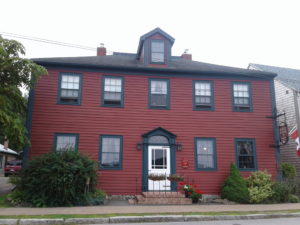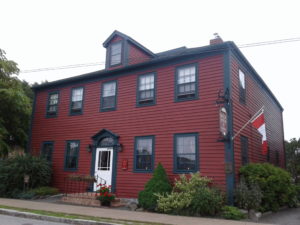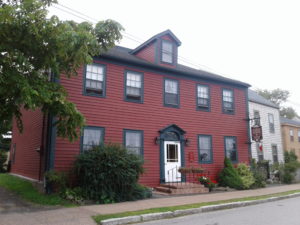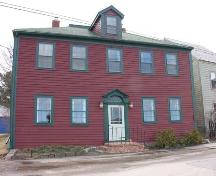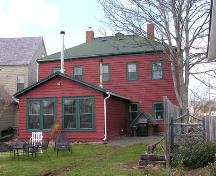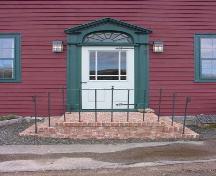150 St. George Street
150 St. George Street, Annapolis Royal, Nova Scotia, B0S 1A0, Canada
Formally Recognized: 1982/01/25
Other Name(s)
150 St. George Street
Bailey House
Links and Documents
Construction Date(s)
1815/01/01 to 1820/01/01
Listed on the Canadian Register: 2005/04/05
Statement of Significance
Description of Historic Place
150 St. George Street, commonly known as the Bailey House, was built around 1770 and is a two-storey, wood framed structure in the Georgian style, with a truncated hip roof. It is situated at the lower end of St. George Street, Annapolis Royal, N.S. and is close to the street facing the Annapolis Basin at an angle to the neighboring houses. The exterior of the Bailey House remains the same as when it was built with one exception, an extension on the rear. During the early years this historic residential district was a fashionable place to live with many prominent residents and visitors. The designation includes the property and the building.Heritage Value
The heritage value of Bailey House, as recognized in its municipal designation, is found in its age, rare architectural style, and historical associations.The house was built circa 1770. It passed to John Eason, master artificer at near by Fort Anne, who sold it in 1783 to Joseph Totten, a prominent Loyalist merchant. During the American Revolution thousands of British supporters fled to the Maritimes, and became known as Loyalists. During the 1794 visit of Prince Edward (later Duke of Kent), who was commander-in-chief of the British forces in Nova Scotia and New Brunswick, to Annapolis Royal he attended, according to local tradition, a grand reception hosted by Colonel Stephen DeLancey followed by a lavish ball given by Joseph Totten in his home, the Bailey House. In 1837 the house was sold to Elizabeth Bailey, wife of Thomas Bailey (son of Rev. Jacob Bailey), prominent minister of St. Luke’s Anglican Church, the garrison church for soldiers stationed at Fort Anne. After her husband died, Bailey and her three daughters operated the house as an upper-class boarding house. Thomas Chandler Halliburton, Member of Provincial Parliament, Member of Parliament (British), judge and author, was a frequent visitor. It was Haliburton who gave Bailey the nickname ‘Marm Bailey’, a name still used today. In 1890 another famous visitor was the Marquis of Lorne, husband of Princess Louise, fourth daughter of Queen Victoria. After Bailey’s death her daughters continued to run the boarding house until it was willed to St. Luke’s Anglican Church in 1910.
The Bailey House is also valued for its age, as one of the few surviving eighteenth century buildings in Annapolis Royal. Built of post and beam construction in simple Georgian style, it has a truncated hip-roof with narrow cornice and frieze and symmetrical features. A unique feature is the single gable dormer of narrow proportion overlooking the street façade. The siding is of clapboard and shingle with plain corner boards. The windows are double hung with molded trim head and sides with wood slip sill on the ground level. The others are plain. The front entrance is distinctive with pediment, rounded fluted pilasters, both with finely carved dentils, plain architrave with flush fan transom windows above a six panel door. The interior has many examples of original woodwork and decorative trim.
The Bailey House is an example of a residence that has survived over two hundred or more years of change to appear today a well preserved private residence reflecting the importance of heritage buildings to the community.
Source: Heritage Property Files, MAP # 213, 150 St. George Street, Town Hall, Annapolis Royal.
Character-defining Elements
Character-defining elements of Bailey House relate to its Georgian architecture and age, and include:- angled positioning on St. George Street;
- single detached massing;
- narrow gable dormer;
- wooden six-over-six windows and trim;
- symmetrical positioning of windows on street façade and rear;
- front entrance with pediment, fluted pilasters, fan transom window and six panel door;
- finely carved dentils on pediment and pilasters;
- truncated hip roof;
- interior original woodwork and decorative trim.
Recognition
Jurisdiction
Nova Scotia
Recognition Authority
Local Governments (NS)
Recognition Statute
Heritage Property Act
Recognition Type
Municipally Registered Property
Recognition Date
1982/01/25
Historical Information
Theme - Category and Type
Developing Economies
Trade and Commerce
Peopling the Land
Settlement
Function - Category and Type
Current
Residence
Multiple Dwelling
Historic
Residence
Estate
Additional Information
Location of Supporting Documentation
Heritage Property Files, Town Hall, 285 St. George Street, Annapolis Royal, NS
FED/PROV/TERR Identifier
02MNS0007






